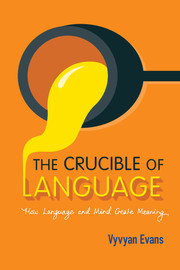Book contents
- Frontmatter
- Dedication
- Epigraph
- Contents
- List of figures
- List of tables
- Preface
- Acknowledgements
- I The ineffability of meaning
- II Meaning in mind
- III Meaning in language
- Chapter 8 Webs of words
- Chapter 9 Meaning in the mix
- Chapter 10 The cooperative species
- Chapter 11 The crucible of language
- Epilogue: The golden triangle
- Notes
- References
- Index
Chapter 8 - Webs of words
from III - Meaning in language
Published online by Cambridge University Press: 05 November 2015
- Frontmatter
- Dedication
- Epigraph
- Contents
- List of figures
- List of tables
- Preface
- Acknowledgements
- I The ineffability of meaning
- II Meaning in mind
- III Meaning in language
- Chapter 8 Webs of words
- Chapter 9 Meaning in the mix
- Chapter 10 The cooperative species
- Chapter 11 The crucible of language
- Epilogue: The golden triangle
- Notes
- References
- Index
Summary
The American poet Emily Dickinson, commenting on the power of words, once said: ‘I know nothing in the world that has as much power as a word. Sometimes I write one, and I look at it, until it begins to shine’. And, in one of popular fiction's most memorable explorations into the nature of words, Humpty Dumpty examines their ultimate, shape-shifting malleability. In Through the Looking Glass, Humpty asks Alice how old she is. This leads to a discussion of the nature of word meaning:
Humpty: ‘There's glory for you!’
‘I don't know what you mean by “glory,”’ Alice said.
Humpty Dumpty smiled contemptuously. ‘Of course you don't – till I tell you. I meant “there's a nice knock-down argument for you!”’
‘But “glory” doesn't mean “a nice knock-down argument,”’ Alice objected.
‘When I use a word,’ Humpty Dumpty said in rather a scornful tone, ‘it means just what I choose it to mean – neither more nor less.’
‘The question is,’ said Alice, ‘whether you CAN make words mean so many different things.’
‘The question is,’ said Humpty Dumpty, ‘which is to be master – that's all.’
Alice was too much puzzled to say anything, so after a minute Humpty Dumpty began again. ‘They've a temper, some of them – particularly verbs, they're the proudest – adjectives you can do anything with, but not verbs – however, I can manage the whole lot of them! Impenetrability! That's what I say!’
‘Would you tell me, please,’ said Alice ‘what that means?’
‘Now you talk like a reasonable child,’ said Humpty Dumpty, looking very much pleased. ‘I meant by “impenetrability” that we've had enough of that subject, and it would be just as well if you'd mention what you mean to do next, as I suppose you don't mean to stop here all the rest of your life.’
‘That's a great deal to make one word mean,’ Alice said in a thoughtful tone.
But is Humpty Dumpty right: can words mean anything we want? The traditional view of language and the mind is a clear no. We have a mental dictionary, so received wisdom maintains. This mental dictionary, or ‘lexicon', contains all the words we know. And each word has a prescribed sense – what it conveys – and a prescribed set of referents – things in the world it can refer to.
- Type
- Chapter
- Information
- The Crucible of LanguageHow Language and Mind Create Meaning, pp. 193 - 224Publisher: Cambridge University PressPrint publication year: 2015



